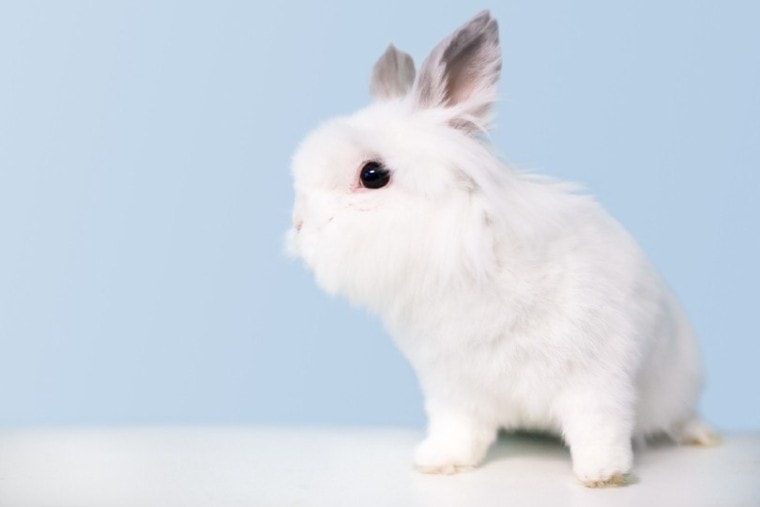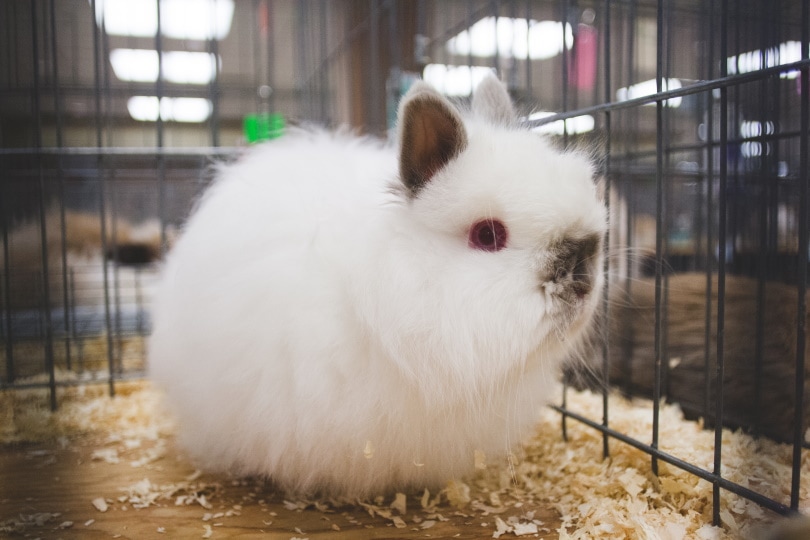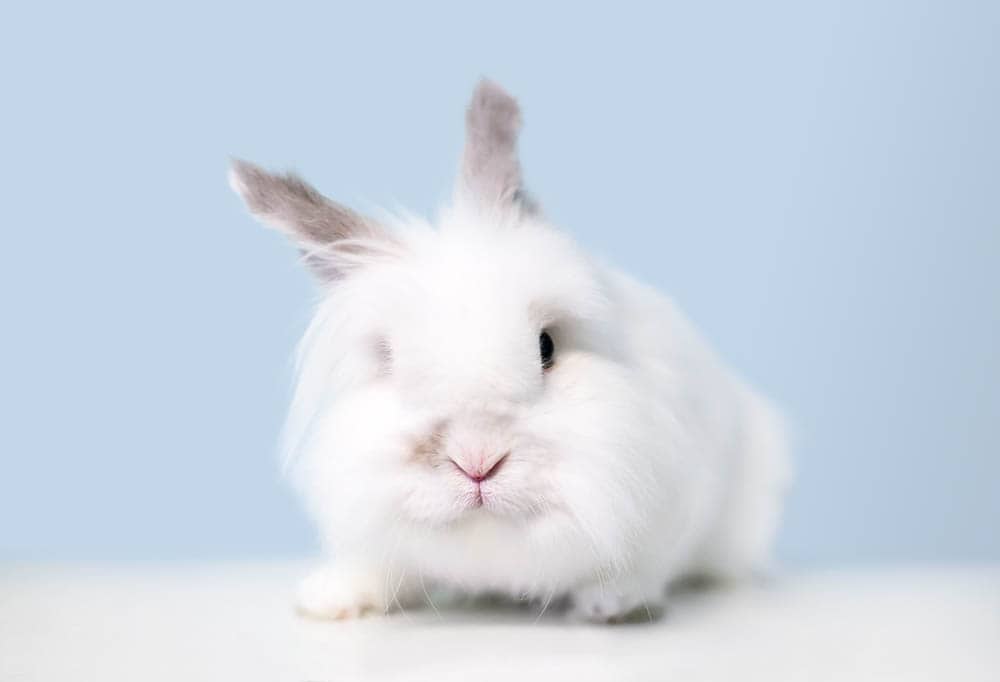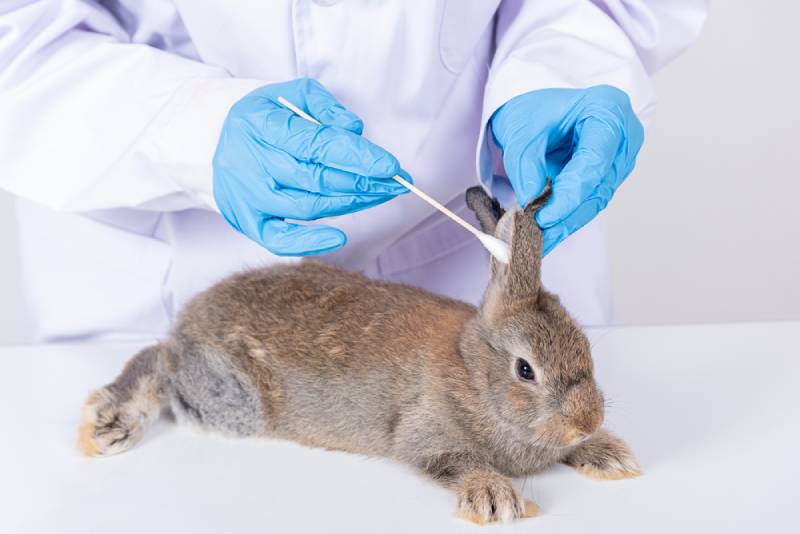
The Jersey Wooly is a newer rabbit breed that was first introduced to the American Rabbit Breeders Association in 1984. This breed was created through the interbreeding of the French Angora rabbit and the Netherland Dwarf rabbit. This results in a tiny bunny with a very poofy coat.
It is now one of the most widely-exhibited rabbits at shows in the United States. It is also a very popular pet. In this article, we’ll look at everything you need to know about Jersey Wooly Rabbits.
Quick Facts About the Jersey Wooly Rabbit
| Species Name: | Jersey Wooly Rabbit |
| Family: | Leporids |
| Care Level: | Moderate |
| Temperature: | Moderate only (not suitable for extreme temperatures) |
| Temperament: | Friendly and docile |
| Color Form: | Many |
| Lifespan: | 7 – 10 years or more |
| Size: | 2.5 – 3.5 pounds |
| Diet: | Hay, pellets, fresh veggies |
| Minimum Tank Size: | 1 foot for every pound of body weight |
| Tank Set-Up: | Food and water, hay, bedding, litterbox, hiding places |
| Compatibility: | Other rabbits of a similar size |
Overview:

This Jersey Wooly rabbit is tiny. It weighs only 1-3 pounds, which officially makes it a dwarf breed. They have small, erect ears that only stand a couple of inches tall. Their heads are square and prominent. For this reason, they have what is affectionally known as a “mug head.”
These rabbits are extremely popular, so they are some of the more common pets around. They are easy to find and usually don’t cost very much.
How Much Do Jersey Wooly Rabbits Cost?
These rabbits usually cost just as much as other rabbit pets. For the average pet rabbit, you can expect to pay about $20–$50. Pet-quality rabbits are perfect for those who do not plan to breed or show their bunnies. If you want a rabbit for your home, a pet-quality rabbit is precisely what you want.
Alternatively, you can purchase a show-quality rabbit for a much higher price. Most will cost at least $100, though some can cost up to a few hundred dollars. However, most people do not need a show-quality rabbit—unless, of course, you’re planning on showing your rabbit.
Typical Behavior & Temperament
These rabbits are usually pretty friendly and family-oriented. They were bred to be family pets, so they are typically great as pets. They are known as “no-kick bunnies,” which describes the Jersey Wooly rabbit temperament quite well. They are gentle and docile. They don’t tend to bite or kick, though they will still defend themselves if they feel threatened. They are usually quite docile.
They can be a good option for families with small children, mostly because they are easy to handle. However, small children will need supervision around them, as these small rabbits are easily injured. Overall, they are very affectionate with children and adults alike.
If you’ve never owned a rabbit before, then this is a great place to start.

Appearance & Varieties
These rabbits are quite fuzzy. Their coat needs to be groomed and brushed to keep it clean and tangle-free, even if the rabbit seems to do an excellent job at keeping their coat clean. Adult rabbits often shed in the spring, so they will need to be brushed more during this period.
Unlike other wooly breeds, these rabbits do not need to be trimmed or clipped. Their fur doesn’t continuously grow. This makes them relatively low-maintenance, especially for first-time owners.
These rabbits come in six different color groups. These colors include chestnut, chinchilla, opal, and squirrel. They can also be black, blue, chocolate, or lilac, or white with blue points.
How to Take Care of a Jersey Wooly:
Habitat Conditions & Setup
Because these rabbits are small, they need to be kept indoors. They are not resistant to extreme temperatures and can easily be injured by predators. They shouldn’t just be kept in a habitat, either, as they need to hop around and get plenty of exercise as well. Rabbit-proofing your home is a must, especially electrical wires.
However, when they can’t be supervised, an enclosure is a must. It should be large enough for the rabbit to stretch out comfortably, though this shouldn’t be large because a Jersey Wooly bunny is tiny.
Cages
Generally, these rabbits need an enclosure of at least 1 foot per pound. Preferably, you should choose a larger cage, though. Because these rabbits are so small, you can often choose a more extensive habitat than the minimum.
In the cage, you will need to provide food and water dishes. You should also provide a litter box and a separate place for the rabbit to sleep.
The cage should be made with a solid bottom. Wire bottoms can harm a cat’s feet, and a rabbit this small can quickly get stuck, which can cause serious injuries. Tanks like those used for fish are not suitable, as they have reduced airflow and rabbits don’t always understand glass.
Bedding
You will need an area for your rabbit to sleep, which should have edible-safe bedding. Rabbits tend to eat their bedding, so only use things that are suitable to be eaten. Fleece is the most popular option, as it is digestible.
You will also need a deep layer of bedding across the whole cage, as this will keep the pet comfortable. The bedding should be spot-cleaned daily and thoroughly changed at least every other week. Some rabbits may be particularly dirty, which means they will need more bedding.
Hiding places are essential, as these rabbits can be easily frightened due to their small size. They will hide when they hear loud noises. Hiding places should have two openings.
Do Jersey Wooly Rabbits Get Along With Other Pets?
These rabbits are friendly and non-aggressive. However, they are tiny. This means they are often harmed by other animals, especially cats and dogs. They should not be kept with other pets for this reason. They are often considered prey animals.
These rabbits should not be allowed to roam the home with other animals out, nor should other animals be allowed near their cage. These rabbits are easily stressed and can suffer cardiac problems if an excitable dog begins running around near their cage.
They work best at home without any other pets. However, they can be kept separately in a room in multi-pet households.
What to Feed Your Jersey Wooly Rabbit
These rabbits are herbivores, just like all rabbits. They do need a varied diet, though. They should have unlimited access to high-quality hay. This hay will likely make up about 80% of their diet, as it works as a nutrient-rich fiber. Their intestinal tract cannot work correctly without it.
They should spend a large portion of their time chewing on the hay, and keeping their teeth trimmed. Overgrown teeth can be dangerous and painful. Hopefully, the hay will prevent the teeth from overgrowing.
Fresh pellets should also be provided, as they help the rabbit meet their nutritional needs. About 1/8 cup to 1/4 cup should be provided a day. Avoid mixes that include things like dried fruit, corn, and seeds. These are high in carbohydrates but low in nutrients.
Leafy greens are also essential. They add fiber, vitamins, and minerals to your pet’s diet. About a cup should be provided a day, though it should be spread over four meals. Smaller rabbits may need less.
Treats should be avoided altogether, as these rabbits are relatively small. Even a little bit of treats can cause significant problems.
Keeping Your Jersey Wooly Rabbit Healthy
These rabbits are pretty healthy, but they are prone to injuries due to their small size. They can fit in small places and get stuck, making it essential to keep an eye on them at all times when they are outside of their enclosure. You should also ensure that the rabbits are in a safe enclosure.
You should groom your rabbit regularly to prevent their wool from getting lodged in their digestive tract. This can be reasonably serious but can be prevented quite easily through regular brushing.
They are also prone to dental problems as their teeth continuously grow. You will need to provide hay and chew toys so that your rabbit can wear down its teeth through chewing. You should also keep an eye on your rabbit’s teeth to ensure that they are not growing too long.
An improper diet can also result in bladder problems, especially if your rabbit is overeating calcium. They are highly susceptible to bladder stones, which are also caused by improper diet.
Due to their large fur, these rabbits are prone to flystrike. These are most common in rabbits that aren’t grooming themselves properly for whatever reason. If your rabbit is not grooming themselves properly, it is likely because of an underlying condition, like obesity or a dental issue. This is why it is essential to keep your rabbit healthy.
Breeding
Jersey Rabbits are small, so they reach maturity very early. They can usually breed around four months. They only ovulate after mating, so there is no timing necessary. However, sometimes the female will not be “in the mood,” and the mating will need to be tried again the next day.
Pregnancy can be detected through palpitations or weight change. Usually, changes can be detected about 12 days after breeding.
The actual pregnancy can take anywhere from 31 to 33 days. However, it depends mostly on the size of the litter. Smaller litters can take longer. A birthing box should be provided around day 28 so that the rabbit can begin preparing it slightly before the babies arrive.
Are Jersey Wooly Rabbits Suitable for You?
These are fantastic family pets. However, they still require a decent amount of care. You’ll need to brush them regularly, as well as keep them in a suitable habitat. They require a specific diet, which should be carefully provided.
They aren’t particularly prone to any health conditions, but you will need to keep them healthy by providing for their basic needs.
They can be good with small children, but they are easily injured through improper handling. For this reason, they should always be supervised by children. However, as far as rabbits go, they are some of the best for smaller kids.
Featured Image Credit: Mary Swift, Shutterstock










